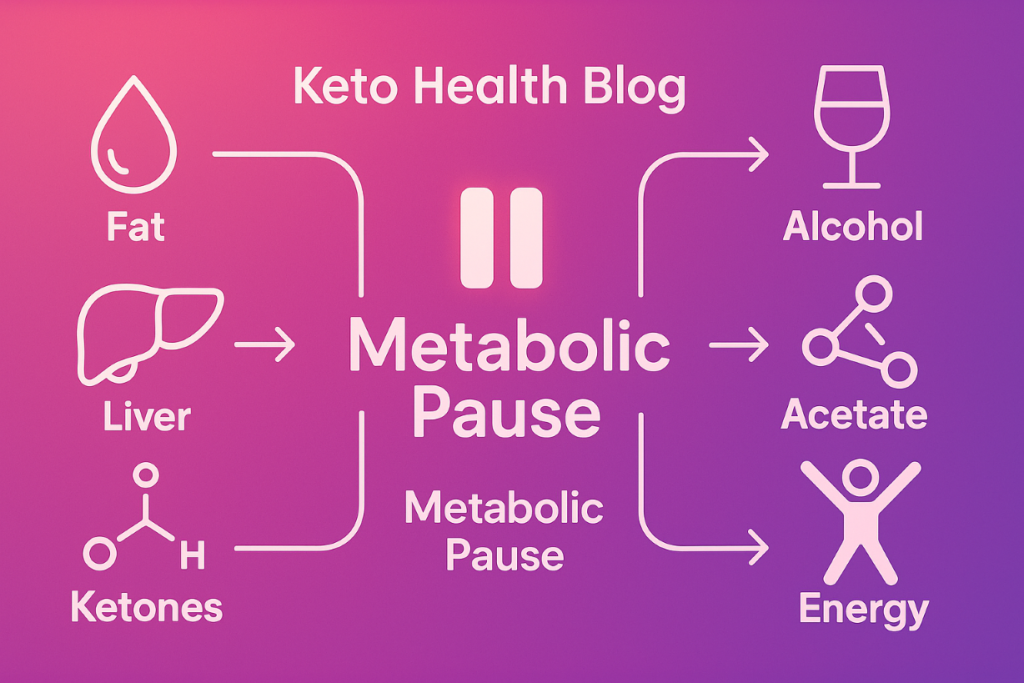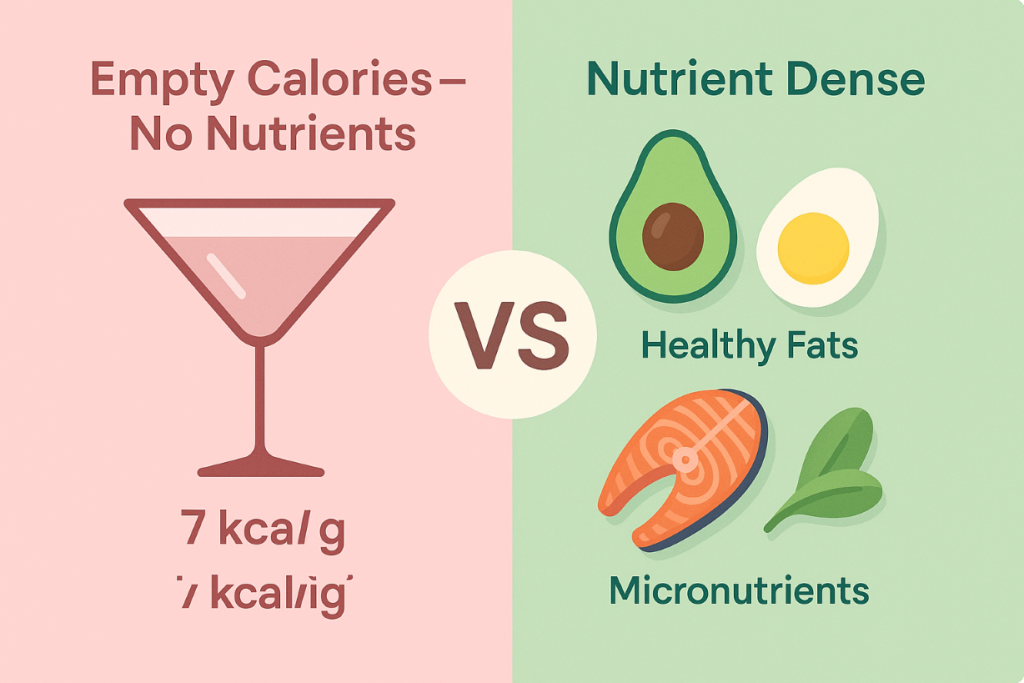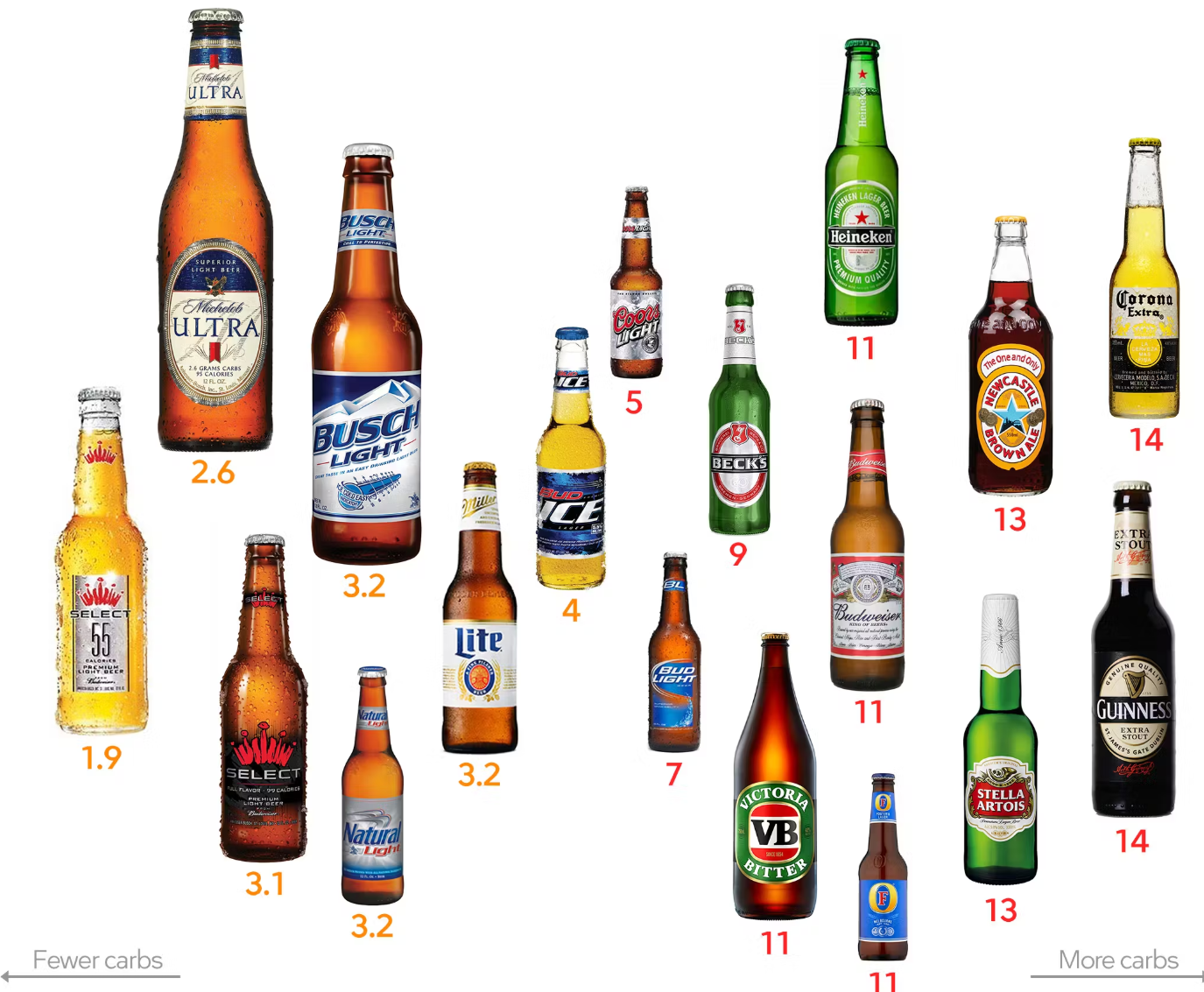Introduction
The ketogenic diet has surged in popularity, celebrated for its ability to promote fat loss, mental clarity, and stable energy levels. Central to keto’s effectiveness is the body’s shift from burning glucose to producing and utilizing ketones for fuel—a process called ketosis. But what happens when you introduce alcohol into this finely tuned metabolic state? Many people wonder if that glass of wine or shot of whiskey will derail their progress, and the answer is more complex than a simple “yes” or “no.”
This article explores the science behind alcohol metabolism, its lack of nutritional value, and how it temporarily halts ketone production, acting as a “metabolic pause.” We’ll break down the biochemistry, discuss the implications for keto dieters, and offer practical advice for those who want to enjoy a drink without sabotaging their goals.
1. The Basics: What Happens in Ketosis?
To understand alcohol’s impact, it’s important to first grasp what ketosis is and how your body gets there. Normally, the body relies on carbohydrates for energy. When you restrict carbs, your liver begins converting fatty acids into ketone bodies—acetoacetate, beta-hydroxybutyrate, and acetone—which become the primary fuel source for your brain and muscles.
This metabolic switch is what makes the ketogenic diet unique. Instead of the blood sugar highs and lows associated with carb-heavy diets, ketosis provides a steady stream of energy, reduces hunger, and can even improve cognitive function. But this delicate balance can be disrupted by certain dietary choices—alcohol being a major one.
2. Alcohol: What Is It, Nutritionally Speaking?
Alcohol, or ethanol, is a unique macronutrient. Unlike carbohydrates, fats, or proteins, it provides energy (7 calories per gram) but no essential nutrients. It doesn’t supply vitamins, minerals, amino acids, or fatty acids. In fact, alcohol is often referred to as “empty calories” because it adds to your caloric intake without contributing anything beneficial to your body’s nutritional needs.
When you drink alcohol, your body treats it as a toxin. The liver prioritizes breaking down and eliminating alcohol over other metabolic processes, including the production of ketones. This is where the concept of a “metabolic pause” comes into play.
3. The Science of Alcohol Metabolism
When you consume alcohol, it is rapidly absorbed into the bloodstream through the stomach and small intestine. The liver is the primary site for alcohol metabolism, using two main enzymes: alcohol dehydrogenase (ADH) and aldehyde dehydrogenase (ALDH). Here’s a simplified breakdown:
- Ethanol → Acetaldehyde (via ADH)
- Acetaldehyde → Acetate (via ALDH)
- Acetate → Acetyl-CoA (enters the Krebs cycle for energy production)
Acetate, the end product of alcohol metabolism, is a small molecule that can be used for energy. However, the body prefers to use acetate over other fuel sources, including fatty acids and ketones, whenever it’s available. This is a crucial point for anyone on a ketogenic diet.

4. Alcohol as a Metabolic Priority
The body sees alcohol as a toxin and wants to get rid of it as quickly as possible. As soon as you take a drink, your liver shifts gears, prioritizing the breakdown of alcohol above all else. This means that the metabolism of fats (and thus the production of ketones) is temporarily put on hold.
Why does this happen?
Alcohol cannot be stored in the body, so it must be metabolized immediately. The presence of alcohol in the bloodstream signals the liver to stop other metabolic processes, including gluconeogenesis (making glucose from non-carbohydrate sources) and ketogenesis (making ketones from fat).
The result:
While your body is processing alcohol, it’s not burning fat for fuel or producing ketones. Instead, it’s burning acetate, the byproduct of alcohol metabolism.
5. Acetate: The “Metabolic Pause” Fuel
Acetate is a simple molecule that the body can use for energy, but it’s not a preferred or efficient fuel source. When you drink alcohol, your blood levels of acetate rise, and your body uses it for energy instead of fatty acids or ketones. This is why alcohol is often described as causing a “metabolic pause” in ketosis.
Key points about acetate:
- It is rapidly oxidized for energy.
- It suppresses the oxidation of fatty acids.
- It halts ketone production until alcohol is cleared from the system.
This means that even if you’re eating a strict ketogenic diet, drinking alcohol will temporarily stop your body from making and using ketones. Once the alcohol is metabolized and acetate levels drop, your body will resume fat burning and ketone production.
6. Alcohol and Nutritional Value: The Empty Calorie Problem
As mentioned earlier, alcohol provides calories but no essential nutrients. This can be problematic for several reasons:
- No vitamins or minerals: Alcohol doesn’t supply any of the micronutrients your body needs for optimal health.
- No protein or healthy fats: It doesn’t help build or repair tissues, support hormone production, or provide essential fatty acids.
- Potential for nutrient depletion: Chronic alcohol consumption can actually deplete your body of important nutrients, including B vitamins, magnesium, and zinc.
For someone on a ketogenic diet, where every calorie counts and nutrient density is key, alcohol offers nothing of value. In fact, it can make it harder to meet your nutritional needs, especially if it replaces more nutrient-dense foods in your diet.

7. Alcohol’s Impact on Fat Loss
One of the main reasons people choose the ketogenic diet is for its fat-burning benefits. But alcohol can interfere with this process in several ways:
- Metabolic pause: As discussed, your body stops burning fat and making ketones while it processes alcohol.
- Increased fat storage: Because the body is busy metabolizing alcohol, dietary fat is more likely to be stored rather than burned.
- Appetite stimulation: Alcohol can lower inhibitions and increase appetite, making it easier to overeat or make poor food choices.
- Hormonal disruption: Alcohol can affect hormones related to hunger, satiety, and fat storage, including insulin, leptin, and ghrelin.
The bottom line: Drinking alcohol can slow or stall your fat loss progress, even if you stay within your daily carb limit.
8. Alcohol and Blood Sugar
While pure alcohol (like vodka, gin, or whiskey) doesn’t contain carbs, many alcoholic beverages do. Beer, sweet wines, liqueurs, and cocktails can be loaded with sugar, which can quickly kick you out of ketosis.
Even if you stick to low-carb options, alcohol can still affect your blood sugar. It can cause both hypoglycemia (low blood sugar) and hyperglycemia (high blood sugar), depending on the type and amount consumed, as well as your individual metabolism.
For people with diabetes or insulin resistance, alcohol can be particularly risky. It can mask the symptoms of low blood sugar and make it harder to manage your condition.
9. Alcohol and the Liver
The liver is the workhorse of metabolism, responsible for processing not only alcohol but also fats, proteins, and carbohydrates. Chronic alcohol consumption can damage the liver, leading to fatty liver disease, inflammation, and even cirrhosis.
For those on a ketogenic diet, liver health is especially important. The liver is where ketones are made, and any impairment can affect your ability to stay in ketosis and reap the benefits of the diet.
10. Alcohol and Recovery: The Hangover Effect
Alcohol is a diuretic, meaning it increases urine production and can lead to dehydration. This is one reason why hangovers are so unpleasant. Dehydration can also affect electrolyte balance, which is already a concern for people on a ketogenic diet.
Common symptoms of a hangover—headache, fatigue, nausea, and brain fog—can be exacerbated on keto, where maintaining proper hydration and electrolyte levels is crucial.
11. Alcohol and Sleep
Many people believe that alcohol helps them sleep, but the reality is more complicated. While alcohol can make you feel drowsy and help you fall asleep faster, it disrupts the quality of your sleep, particularly REM sleep. Poor sleep can affect everything from mood and cognitive function to appetite and metabolism.
On a ketogenic diet, where mental clarity and stable energy are prized benefits, anything that disrupts sleep can undermine your progress.
12. Alcohol and Social Life: Finding Balance
For many people, alcohol is a social lubricant and a part of celebrations and gatherings. The good news is that you don’t have to give up alcohol entirely to succeed on a ketogenic diet. The key is moderation and making informed choices.
Tips for enjoying alcohol on keto:
- Choose low-carb options like dry wine, spirits, or light beer.
- Avoid sugary mixers and cocktails.
- Drink plenty of water and replenish electrolytes.
- Eat before you drink to slow alcohol absorption.
- Be mindful of portion sizes and frequency.
Remember, the occasional drink is unlikely to derail your progress, but regular or excessive consumption can have cumulative negative effects.
13. Alcohol and Mental Health
Alcohol is a depressant, meaning it slows down the central nervous system. While it can temporarily reduce anxiety or stress, it can also worsen mood disorders, disrupt sleep, and impair judgment. For those using the ketogenic diet to support mental health, alcohol can be counterproductive.
14. Alcohol and Athletic Performance
If you’re using the ketogenic diet to support athletic performance, alcohol can be a hindrance. It impairs coordination, reaction time, and recovery. It also dehydrates the body and can interfere with muscle protein synthesis.
15. Alcohol and Long-Term Health
Chronic alcohol consumption is associated with a range of health problems, including liver disease, heart disease, certain cancers, and neurological disorders. While moderate consumption may have some social or psychological benefits, the risks often outweigh the rewards, especially for those focused on optimizing health and longevity.
16. The Takeaway: Alcohol Is a Metabolic Pause, Not a Nutritional Boost
To sum up, alcohol provides no nutritional benefit and temporarily halts the metabolic processes that make the ketogenic diet effective. When you drink, your body stops burning fat and making ketones, focusing instead on eliminating alcohol and its byproducts. This “metabolic pause” can slow fat loss, disrupt ketosis, and make it harder to achieve your health goals.
If you choose to drink, do so mindfully and in moderation. Opt for low-carb options, stay hydrated, and be aware of how alcohol affects your body and your progress. Remember, the occasional drink is unlikely to ruin your results, but regular consumption can add up over time.
17. Frequently Asked Questions
Q: Can I drink alcohol and stay in ketosis?
A: It’s possible, especially if you choose low-carb options and drink in moderation. However, your body will temporarily stop producing ketones while it processes alcohol.
Q: How long does the “metabolic pause” last?
A: It depends on the amount of alcohol consumed, your body size, and your liver’s efficiency. Generally, it takes about one hour to metabolize one standard drink.
Q: Does alcohol kick you out of ketosis?
A: Pure alcohol doesn’t contain carbs, so it won’t directly kick you out of ketosis. However, it halts ketone production until it’s metabolized.
Q: What are the best alcoholic drinks for keto?
A: Spirits like vodka, gin, tequila, and whiskey (without mixers) are the lowest in carbs. Dry wines and light beers are also relatively low in carbs.
Q: Can alcohol slow weight loss on keto?
A: Yes. Alcohol provides extra calories and temporarily stops fat burning, which can slow or stall weight loss.
18. Practical Tips for Keto Drinkers
- Plan ahead: If you know you’ll be drinking, adjust your food intake to account for the extra calories.
- Stay hydrated: Drink water before, during, and after consuming alcohol.
- Replenish electrolytes: Alcohol can deplete sodium, potassium, and magnesium.
- Listen to your body: Notice how alcohol affects your energy, mood, and progress.
- Prioritize quality: Choose drinks you truly enjoy and savor them, rather than drinking out of habit.
19. Conclusion
Alcohol is woven into the fabric of many cultures and social occasions, but it’s important to understand its effects on your body, especially if you’re following a ketogenic diet. While it may offer temporary relaxation or enjoyment, alcohol provides no nutritional value and acts as a metabolic pause, shifting your body’s focus from fat burning and ketone production to processing acetate.
By making informed choices and practicing moderation, you can enjoy the occasional drink without derailing your progress. Remember, the true benefits of the ketogenic diet come from consistent, mindful choices that support your health and well-being.
References:
- Lieber, C. S. (1991). Hepatic, metabolic and toxic effects of ethanol: 1991 update. Alcoholism: Clinical and Experimental Research, 15(4), 573-592.
- Paoli, A., Rubini, A., Volek, J. S., & Grimaldi, K. A. (2013). Beyond weight loss: a review of the therapeutic uses of very-low-carbohydrate (ketogenic) diets. European Journal of Clinical Nutrition, 67(8), 789-796.
- Siler, S. Q., Neese, R. A., & Hellerstein, M. K. (1999). De novo lipogenesis, lipid kinetics, and whole-body lipid balances in humans after acute alcohol consumption. American Journal of Clinical Nutrition, 70(5), 928-936.
- Cederbaum, A. I. (2012). Alcohol metabolism. Clinics in Liver Disease, 16(4), 667-685.




